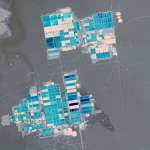NIGERIA: Shell told to pay $1.5 bln damages
A Nigerian court said on Friday Royal Dutch Shell should pay $1.5 billion (861 billion pounds) in damages for pollution in oil-producing Bayelsa state, the latest instalment in a long-running case.
Judge Okechukwu Okeke upheld a resolution by the National Assembly that Shell should pay the money to ethnic Ijaw communities in Bayelsa, in the impoverished Niger Delta which produces all of Nigeria's 2.4 million barrels per day of oil.
"The court entered a judgement in favour of the Ijaw Aborigines, ruling that, since SPDC chose to participate in the National Assembly hearing, it had submitted to their jurisdiction and thus is bound by their resolution," SPDC, the Nigerian arm of Shell said in a statement.
"SPDC has appealed the judgement on, among other grounds, the strength of independent expert advice, which demonstrates that there is no evidence to support the claims of the group," the company said.
The appeal will lead to further lengthy procedures before the case is settled for good.
The Nigerian Senate approved the fine in August 2004 after it was presented to the lower House of Representatives in 2003 and reviewed by an independent legal advisory panel set up by the lower house.
Communities often accuse Shell of allowing its oil to spill into the rivers and swamps of the Niger Delta, spoiling crops and driving fish away.
Shell says most spills are caused by saboteurs trying to steal the oil for sale by international criminal syndicates on the world market.
Chief Malla Sasime, traditional ruler of the Ijaw Epie Kingdom in Bayelsa, said Shell should pay up immediately.
"Our people have gone through due process to get the judgement ... They must pay the money or be ready to leave our land," he told reporters after the hearing.
The payment of $1.5 billion to Bayelsa communities was also one of a series of demands issued by militants last month during a campaign of sabotage and kidnapping against the oil industry.
The militants made the demand after kidnapping four foreign oil workers in January, but released them after 19 days without Shell making any promises on the payment.
The same Ijaw militants are now holding nine more foreign oil workers captive and have threatened more attacks against oil installations.
Decades of living alongside the multibillion dollar oil industry have brought few benefits to the estimated 20 million people who live in the delta, mostly in extreme poverty.
The perceived injustice of this state of affairs fuels militancy, sabotage, oil theft and kidnappings and this in turn draws sometimes brutal repression from the military.
(Additional reporting by Tom Bergin in London)
- 107 Energy
- 190 Natural Resources



